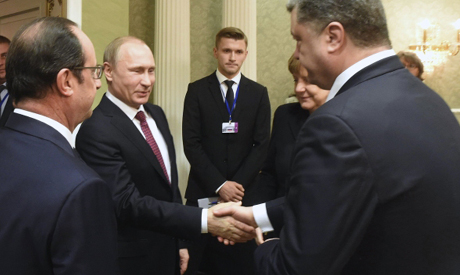
Russian President Vladimir Putin, second left, and Ukrainian President Petro Poroshenko, right, shake hands as French President Francois Hollande, left, and German Chancellor Angela Merkel look on during a meeting in Minsk, Belarus, Wednesday, Feb. 11, 2015 (Photo: AP)
Leaders of Russia, Ukraine, France and Germany on Thursday emerged from marathon 16-hour talks to announce a comprehensive peace deal for eastern Ukraine, but questions remained whether Ukraine and the pro-Russian rebels have agreed on all of its terms.
Russian President Vladimir Putin told reporters that the agreement envisages a cease-fire that will be effective starting from the start of the day Sunday (21000 GMT or 4 p.m. EST Saturday) as well as a special status for the rebel regions, provisions on border controls and humanitarian issues.
Ukrainian President Petro Poroshenko, however, denied that there was any agreement about autonomy in eastern Ukraine.
More than 5,300 people have died since April in the fighting, which continued to rage Thursday even as the four leaders were engaged in talks.
Speaking to reporters after the exhausting talks, Putin said "it was not the best night in my life but the morning, I think, it is good because we have managed to agree on the main things despite all the difficulties of the negotiations."
Putin added, however, that he and Poroshenko disagreed on assessing the situation in a key flashpoint, the government-held town of Debaltseve, which has been the focus of fierce fighting for weeks.
Putin's statement followed the talks brokered by German Chancellor Angela Merkel and French President Francois Hollande, which dragged for nearly 16 deep into a second day Thursday as the four leaders desperately sought to resolve their differences.
Hollande said he and Merkel are committed to helping verify the cease-fire process in Ukraine, along with the Russian and Ukrainian leaders.
Speaking after the talks, Hollande said the announcement of a new cease-fire deal has come as a "relief to Europe."
A previous cease-fire agreed in September fell apart as Ukrainian government forces and Russian-backed rebels both tried to gain more ground.
"We came to an agreement, an agreement on a cease-fire and on a global political settlement of the Ukrainian conflict," Hollande said. "That global settlement will include all issues, from the cease-fire to the control of the border, to decentralization, and, of course, the pullback of heavy weapons and resuming economic relations."
He also praised Putin for applying "pressure as much as necessary on the separatists."
"We were presented with various unacceptable conditions of withdrawal and surrender," Poroshenko told reporters after the talks. "We did not agree to any ultimatums and stated firmly that the cease-fire that is announced is unconditional."
Poroshenko also said the documents signed envisage the withdrawal of all foreign troops and militants from Ukraine — a reference to the soldiers and weapons that Ukraine and the West say Russia has sent into eastern Ukraine to back the rebels. Moscow has denied the accusations, saying Russians in eastern Ukraine were volunteers, but the sheer number of sophisticated heavy weapons in rebels' possession belies the denial.
The French-German diplomatic dash came as President Barack Obama considered rising calls at home for sending U.S. lethal aid to Ukraine, a move that the European leaders fear would only widen hostilities.
The urgency felt by all sides appeared to be underlined by the extraordinary length and discomfort of the talks, which began Wednesday evening in the Belarusian capital and continued uninterrupted through the night as crowds of reporters waited anxiously in a marble-floored, chandeliered convention hall in Minsk.
While the four leaders hailed the agreement, it became immediately clear that Russia and Ukraine continued to disagree on how to end fighting around Debaltseve, a key transport hub between the two main rebel-controlled eastern cities.
Putin said that the rebels consider the Ukrainian forces surrounded and expect them to surrender, while Ukraine says the troops have been blocked.
Putin urged the warring parties to show restraint, adding that they agreed with Poroshenko to clarify the situation on the ground.
The Russian leader said that the peace deal they reached also determines a division line from which heavy weapons will be pulled back.
The line of division and other key provisions were contained in a document endorsed by rebel chiefs and the representatives of Russia, Ukraine and the Organization for Security and Cooperation in Europe. That agreement was endorsed by the four leaders, who issued a separate declaration.
Short link: